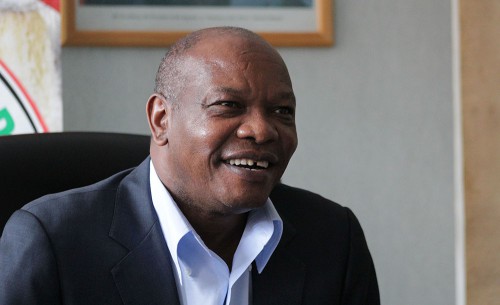


AFTER struggling to build a solid marketing and perception management campaign to convince foreign tourists, especially from China, that Zimbabwe remains a world class destination in spite of the damaging publicity it has endured, a bruised Zimbabwe Tourism Authority (ZTA) chief executive officer, Karikoga Kaseke, said it was time to return to the motherland.
A formidable campaign to expand domestic tourism will kick off in the next weeks, as the ZTA boss hopes to spring surprises. His strategy would be to encourage citizens in a cash-strapped market, which kissed good bye to its once vibrant middle class over a decade ago, to spend time in local resorts. But without a middleclass, a domestic tourism dream would be futile for Kaseke, who has spent a decade burning the taxpayer’s funds on expensive Chinese campaigns.
Arrivals from China and Hong Kong plunged by a massive 273 percent during the first half of this year to 2 730, from 10 173 during the prior comparative period in 2013. Chinese tourists have largely skirted the southern African country, leaving government, the ZTA and the private sector scratching heads to find the reasons behind the disappointing arrivals.
The combative ZTA boss recently vented his frustrations at Zimbabweans flying for holidays to foreign lands. He feels these Zimbabweans could help the recovery of the sector if they visited local destinations. He also took a swipe at this reporter for interrogating and criticising several of his actions, including a failed attempt last year to brazenly violate corporate governance procedures by giving a none executive director a ZTA car.
“We see our own colleagues in Zimbabwe going for holidays outside Zimbabwe,” Kaseke told over 70 reporters, international buyers, tour operators and government officials at the start of the Sanganai/Hlanganani World Tourism Expo.
“It is not bad but they must also visit local destinations. We will be starting a campaign to grow domestic tourism after Sanganai.”
“We need Zimbabweans to visit Zimbabwe.”
Just as the Financial Gazette’s Companies & Markets was about to remind him of the spectre of firm closures and widespread suffering that has engulfed Zimbabwe, the ZTA boss pre-empted. “My former friend from the Financial Gazette will say you want people to go on holiday when they have no disposable incomes,” he said.
“Yes, people have no disposable incomes. This is what my former friend from the Financial Gazette will say. Those who do not know the former friend I am referring to, it’s Shame. Shame is very interrogative in his reporting.” But clearly, with its cluster of world class attractions, excellent climate and a hospitable people, Zimbabwe has failed to measure up to its potential.
While the ZTA says arrivals have been rising, hordes of small scale cross border traders, who do not spend in holiday destinations, continue to dominate the statistics. The contradiction is that tourism companies are folding when statistics show that arrivals are increasing. Scores of world renowned resorts have turned into ruins.
Arrivals from Africa represented 86 percent of the 867 000 tourists who visited Zimbabwe during the first half of the year. The city of Paris alone, receives over 15 million tourists every year. But basing its argument on a United Nation definition that says any person who spends a night at a destination becomes a tourist, hence ZTA insists arrivals have been robust. Government has revised 2014 growth targets to 3,1 percent, from 6,1 percent, which is an indication that the turmoil would be prolonged. Building foundations for a solid domestic tourism could take long.
Across all sectors of the country’s tottering economy, the trading environment has deteriorated, with nearly all companies struggling to stay afloat due to depressed demand and the inability by cash-strapped customers to pay for goods and services on time. At least 10 firms have been closing down every month since the beginning of the year, meaning at least 120 companies could close by year end.
This appears to indicate an acceleration of the economic crisis in the country characterised by a liquidity crunch that has seen domestic companies failing to recapitalise to deal with competition from cheap imports. Plummeting disposable incomes and failure by the fragile banking sector to support industries has worsened the situation.
Kaseke says he will campaign for a two tier pricing system. “We want our hotels to have a two tier pricing system,” he said.
“Zimbabweans must be charged half what foreign tourists are charged.”
newsdesk@fingaz.co.zw